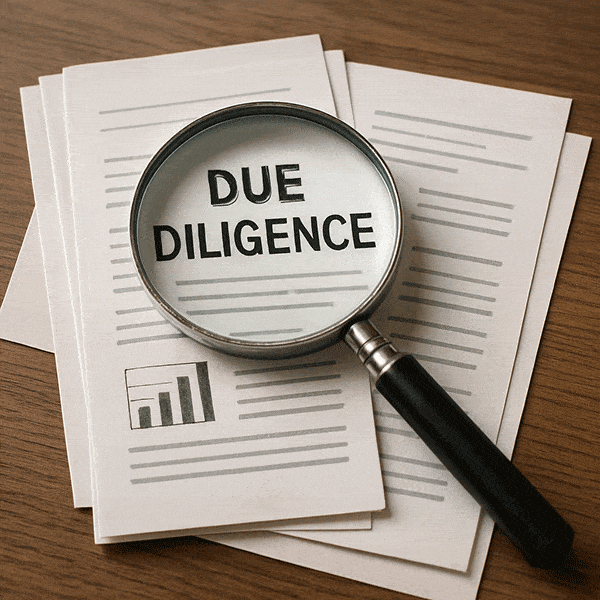How to Approach Due Diligence
Practical Guidance for Biosample Hub Users
Introduction
Biosample Hub connects organisations within the vital bioscience sector, fostering collaborations that drive research and innovation. As a neutral platform, we facilitate introductions but do not endorse any member organisation – whether biobanks, biotech companies, or sponsors.
Building successful and trustworthy collaborations requires informed decisions. Therefore, undertaking your own due diligence on potential partners you connect with via our platform is an essential professional practice. This independent assessment helps ensure alignment with your specific scientific, operational, ethical, and regulatory requirements.
This guide offers practical suggestions on how you might approach these checks.
1. Start with Direct Communication:
Initiate open dialogue with the potential partner. Request relevant documentation directly, such as:
For Biobanks: Evidence of ethical approvals (REC/IRB), sample consent forms (redacted if necessary), quality management system summaries or certifications (e.g., ISO 20387, CAP)
For Biotech Companies: Confirmation of ethical approval for their research (if applicable), information on their sample handling procedures.
For Sponsors: Client references, details on their product/service relevant to your needs. Their responsiveness, transparency, and professionalism in handling these requests can be informative. Be aware that highly detailed or confidential documents (like full SOPs) may require a Non-Disclosure Agreement (NDA).
2. Verify Organizational Legitimacy:
Confirm the organisation legally exists and is operational.
Company Registration: Check official national or state business registries. Resources vary by country:
UK: Companies House offers free online access to company status, filing history, and officer details.
France: Infogreffe or DATA INPI provide access, though some detailed documents may require fees.
USA: Registration is state-based; search the relevant Secretary of State’s database. Access and fees vary significantly by state.
Institutional Affiliation: For university or hospital-based entities, check their presence on the main institution’s official website.
Licenses: Verify any claimed regulatory licenses via the issuing authority’s public register, where available.
3. Assess Quality Standards (Primarily for Biobanks):
Accreditations: Look for relevant quality certifications like ISO 9001 (general quality management), ISO 20387 (biobanking-specific), or CAP accreditation (laboratory/biorepository).
Quality Systems: Inquire about their Quality Management System (QMS), sample handling SOPs, and quality control measures. Assessing the adequacy requires expertise and often more information than initially provided.
4. Confirm Ethical Compliance:
Approvals & Consent: Request evidence of relevant ethics committee (IRB/REC) approvals and appropriate donor consent documentation for the specific samples or data of interest. Scrutinize the scope and limitations of consent.
Data Privacy: Understand how sample-associated data is handled, anonymized, and protected in line with regulations like GDPR (EU/UK) or HIPAA (US, if applicable).
Legal Use: Ensure biotech companies confirm their intended use aligns with ethical approvals and consent provisions.
5. Evaluate Reputation and Track Record:
Online Searches: Use search engines to find news articles, press releases, publications citing the entity (e.g., via PubMed), or relevant online discussions. Look for both positive indicators and potential red flags (e.g., reports of misconduct, regulatory issues).
Professional Networks: Leverage platforms like LinkedIn and inquiries within your professional circles for insights into the organisation’s history, personnel, and standing.
References: Request and follow up on references provided by the potential partner, asking specific questions about their experiences. Remember these are likely pre-selected.
6. Investigate Legal and Financial Standing:
This can be challenging, especially for private or international entities.
Sanctions: Check relevant government sanctions lists, particularly for international collaborations. The US OFAC provides a free online search tool.
Legal Issues: Look for public records of significant litigation, insolvency, or regulatory penalties where accessible (e.g., via some business registries
Financial Stability (Indirect Indicators): For private entities, assess indirect signs like operational history, stable online presence, institutional backing, reputable clients/collaborators, or positive funding news. These are weak proxies.
Financial Stability (Direct Assessment): Obtaining reliable financial data for private companies often requires professional business information services (e.g., Dun & Bradstreet), which involve costs.
7. Navigating Cross-Border Due Diligence:
Be aware of differing legal/regulatory requirements (e.g., tissue handling, data privacy). Use online translation tools cautiously for public documents; consider professional translation for critical items. Internationally recognized standards (e.g., ISO) can be helpful indicators. For complex checks, engaging local professional advisors (lawyers, consultants) in the target country is often advisable.
8. Disclaimer
This guidance provides general suggestions and potential resources for performing due diligence. It is not exhaustive, and the specific checks required will vary depending on the nature of your interaction and your organisation’s risk assessment. Users are solely responsible for conducting their own thorough due diligence appropriate to their specific needs and risk tolerance. This information does not constitute legal, financial, or professional advice. If you require specialized advice, please consult with qualified independent professionals. Biosample Hub assumes no responsibility for the outcome of any due diligence conducted by users or for any interactions or agreements resulting from connections made via the platform.

Table: Due Diligence Criteria Overview
Due Diligence Category |
Biobanks (Providers) |
Biotech Companies (Requesters) |
Organizational Legitimacy |
Verify institutional backing/registration; check required licenses (e.g., HTA); confirm operational status. |
Verify company registration & research activity; confirm key personnel identity/affiliation. |
Quality Standards |
Check accreditations (ISO 20387, ISO 9001, CAP); inquire about QMS/SOPs. | Assess sample handling procedures/facilities; inquire about adherence to R&D quality guidelines. |
Ethical Compliance |
Verify donor consent & ethics (IRB/REC) approval; confirm compliance with local laws (HTA, GDPR); check data privacy practices. | Confirm IRB/REC approval for research; ensure commitment to lawful/ethical sample use & data privacy. |
Reputation & Track Record |
Check references, network memberships, publications; inquire within professional circles. | Check references, prior collaborations; inquire about past conduct/feedback. |
Legal & Financial Standing |
Confirm good standing; verify import/export ability; check sanctions lists |
Verify no sanctions |
